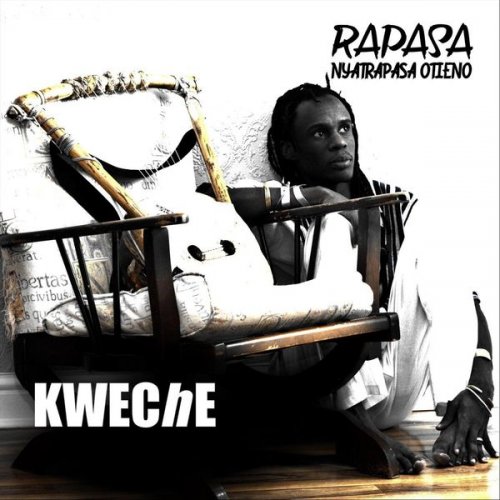
Rapasa Nyatrapasa Otieno - Kweche (2021)
BAND/ARTIST: Rapasa Nyatrapasa Otieno
- Title: Kweche
- Year Of Release: 2021
- Label: John Otieno Oduor
- Genre: world, african, fusion
- Quality: 16-44100 FLAC
- Total Time: 43:25
- Total Size: 256 MB
- WebSite: Album Preview
KWEChE synopsis
In this work Rapasa is looking back at his tradition and what he learnt at a young age from his elders and from growing up in rural Western Kenya. Having moved away from his natal province the artist is reflecting on KWEChE.
You might wonder what is Kweche? What does it mean? The real question you may ask yourself is what does it mean for you? Kweche translates from Dholuo as Taboos with its singular form Kwer. As much as Kweche have been suppressed by some communities, if you look closely you will find some examples relevant to your culture and you will be surprised to find some very similar ones across very different cultures. It has been attempted to define the word taboo/kwer by philosophes and anthropologists however some slight differences can be found in the literature. In the context of this work, taboo is meant as an interdiction emanating from God/Nyasaye/Nyakalaga or ancestral spirits which leads to misfortunes if not adhered to. More specifically in the Luo culture the repercussion can be on the individual, its family or wider village such as disease known as “chira”.
Traditionally, the Luo community encourages marrying outside the tribe. As the community traveled down the Nile from southern Sudan and settled into new territories, they intermarried with members of local tribes they came into contact. As one travels and marries out of his/her community, each is confronted with a different culture with their own customs and sets of taboos which likely differs more or less and have different intensity in their beliefs. What does this mean about the taboos themselves and how we relate to them? How can one explain such differences? How does one adapt to a new culture? How about the effect it has on the children of such marriages. These are questions that live within this work which are illustrated by myths, tales, stories, riddles and proverbs.
Tracklist:
1.01 - Rapasa Nyatrapasa Otieno - Kwithe (5:01)
1.02 - Rapasa Nyatrapasa Otieno - Ongogo (3:22)
1.03 - Rapasa Nyatrapasa Otieno - Pon Kawuoyi (3:22)
1.04 - Rapasa Nyatrapasa Otieno - Oyao Tich (3:10)
1.05 - Rapasa Nyatrapasa Otieno - Buok (3:12)
1.06 - Rapasa Nyatrapasa Otieno - Jirani (3:40)
1.07 - Rapasa Nyatrapasa Otieno - Oyieyo Owe Yoo (4:43)
1.08 - Rapasa Nyatrapasa Otieno - Wich (3:49)
1.09 - Rapasa Nyatrapasa Otieno - Tong' Kose Bilo (4:16)
1.10 - Rapasa Nyatrapasa Otieno - Siayawa (5:14)
1.11 - Rapasa Nyatrapasa Otieno - Andiwo (3:37)
In this work Rapasa is looking back at his tradition and what he learnt at a young age from his elders and from growing up in rural Western Kenya. Having moved away from his natal province the artist is reflecting on KWEChE.
You might wonder what is Kweche? What does it mean? The real question you may ask yourself is what does it mean for you? Kweche translates from Dholuo as Taboos with its singular form Kwer. As much as Kweche have been suppressed by some communities, if you look closely you will find some examples relevant to your culture and you will be surprised to find some very similar ones across very different cultures. It has been attempted to define the word taboo/kwer by philosophes and anthropologists however some slight differences can be found in the literature. In the context of this work, taboo is meant as an interdiction emanating from God/Nyasaye/Nyakalaga or ancestral spirits which leads to misfortunes if not adhered to. More specifically in the Luo culture the repercussion can be on the individual, its family or wider village such as disease known as “chira”.
Traditionally, the Luo community encourages marrying outside the tribe. As the community traveled down the Nile from southern Sudan and settled into new territories, they intermarried with members of local tribes they came into contact. As one travels and marries out of his/her community, each is confronted with a different culture with their own customs and sets of taboos which likely differs more or less and have different intensity in their beliefs. What does this mean about the taboos themselves and how we relate to them? How can one explain such differences? How does one adapt to a new culture? How about the effect it has on the children of such marriages. These are questions that live within this work which are illustrated by myths, tales, stories, riddles and proverbs.
Tracklist:
1.01 - Rapasa Nyatrapasa Otieno - Kwithe (5:01)
1.02 - Rapasa Nyatrapasa Otieno - Ongogo (3:22)
1.03 - Rapasa Nyatrapasa Otieno - Pon Kawuoyi (3:22)
1.04 - Rapasa Nyatrapasa Otieno - Oyao Tich (3:10)
1.05 - Rapasa Nyatrapasa Otieno - Buok (3:12)
1.06 - Rapasa Nyatrapasa Otieno - Jirani (3:40)
1.07 - Rapasa Nyatrapasa Otieno - Oyieyo Owe Yoo (4:43)
1.08 - Rapasa Nyatrapasa Otieno - Wich (3:49)
1.09 - Rapasa Nyatrapasa Otieno - Tong' Kose Bilo (4:16)
1.10 - Rapasa Nyatrapasa Otieno - Siayawa (5:14)
1.11 - Rapasa Nyatrapasa Otieno - Andiwo (3:37)
Year 2021 | World | FLAC / APE
As a ISRA.CLOUD's PREMIUM member you will have the following benefits:
- Unlimited high speed downloads
- Download directly without waiting time
- Unlimited parallel downloads
- Support for download accelerators
- No advertising
- Resume broken downloads


